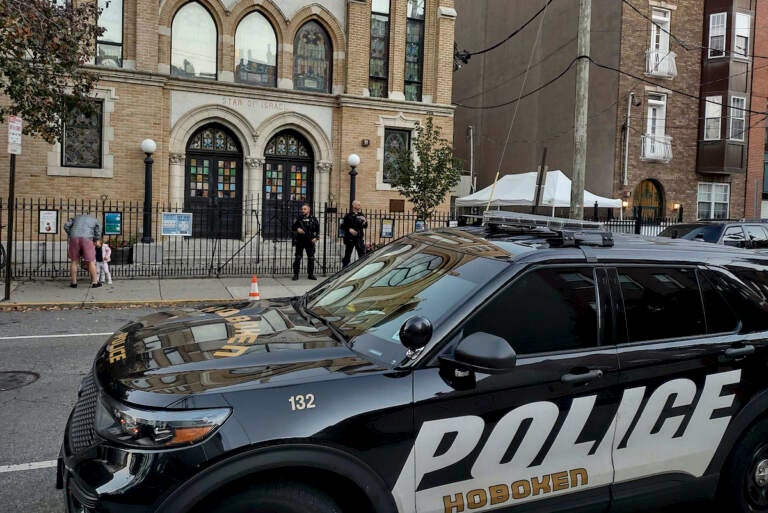N.J. law enforcement, religious leaders review threat landscape and discuss security measures at houses of worship
More than 200 religious leaders from across the Garden State gathered for a meeting on security threats.

File photo: Hoboken Police officers stand watch outside the United Synagogue of Hoboken, Thursday, Nov. 3, 2022, in Hoboken, N.J. (AP Photo/Ryan Kryska)
From Philly and the Pa. suburbs to South Jersey and Delaware, what would you like WHYY News to cover? Let us know!
The New Jersey Office of Homeland Security and Preparedness and other law enforcement groups recently convened a meeting of the Interfaith Advisory Council to discuss potential threats and security measures.
More than 200 religious leaders from across the Garden State met at the beginning of November.
NJOHSP director Laurie Doran said because of the ongoing Gaza conflict, which escalated after the Oct.7 Hamas attack, officials are monitoring developments overseas, but right now there are no credible threats to New Jersey.
“We are continuing with the same threat matrix that we had,” Doran said. “White racially-motivated extremists and the cyber security threat.”
The council also discussed grants and other funding opportunities for security improvement projects.
Rabbi Mendy Carlebach, the director of the Chabad of North and South Brunswick and the administrator of the Chabad House at Rutgers University, said sitting together with other faith leaders, Homeland Security, the FBI, and state and local police was very beneficial. Chabad houses serve as Jewish community centers.
“You can really have all your issues addressed that your community may have,” he said.
Carlebach said a grant, which the Chabad House at Rutgers received, allowed the community to upgrade security in their buildings, thereby keeping their students safe and giving them a sense of safety.
Pastor John R. Taylor of the Friendship Baptist Church in Trenton said being proactive and maintaining a dialogue with law enforcement is important to prevent possible tragedy.
“God forbid, the world we live in today, things can happen at any given time,” he said.
Doran said everyone has a First Amendment right to protest for a cause or group they support, but law enforcement is trying to make sure homegrown violent extremists don’t take advantage of such rallies and vigils to launch any kind of attack.
She stressed maintaining an open and direct communication with faith leaders is important because they are in touch with members of their communities and can share a simple message.
“If something doesn’t feel right there’s a good chance it probably isn’t right, and law enforcement can’t be everywhere, and that’s where we need you to be the eyes and ears,” she said.“If we don’t know about it then we can’t do anything about it.”
Rabbi Carlebach said grant money to improve security is particularly important now because there has been an uptick in antisemitic violence since the conflict in Gaza.
“It doesn’t mean that other faiths, other houses of worship shouldn’t apply, I strongly encourage every house of worship to apply,” he said.
He noted that all religious institutions have to deal with such threats.
Taylor agreed. He said discussing grant opportunities helps religious groups.
“Law enforcement can give you some guidance along the way, direct you in the right direction so that you could get in contact with those grant writers and apply,” he said.
Taylor’s church applied three times for grants before successfully receiving funding.
Doran said federal and state security grants are available for religious and non-profit groups, depending on their level of risk. More information on grantmaking, and applications can be found online.

Get daily updates from WHYY News!
WHYY is your source for fact-based, in-depth journalism and information. As a nonprofit organization, we rely on financial support from readers like you. Please give today.






